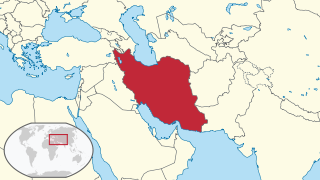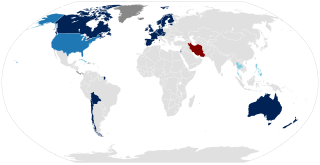Related Research Articles
A person may be considered to be a transgender person if their gender identity is inconsistent or not culturally associated with the sex they were assigned at birth, and consequently also with the gender role and social status that is typically associated with that sex. They may have, or may intend to establish, a new gender status that accords with their gender identity. Transsexual is generally considered a subset of transgender, but some transsexual people reject being labelled transgender.
Gender dysphoria (GD) is the distress a person feels due to a mismatch between their gender identity—their personal sense of their own gender—and their sex assigned at birth. The diagnostic label gender identity disorder (GID) was used until 2013 with the release of the DSM-5. The condition was renamed to remove the stigma associated with the term disorder.
Sex reassignment surgery (SRS), also known as gender reassignment surgery (GRS) and several other names, is a surgical procedure by which a transgender person's physical appearance and function of their existing sexual characteristics are altered to resemble those socially associated with their identified gender. It is part of a treatment for gender dysphoria in transgender people. The term is also sometimes used to describe surgical intervention for intersex people.

The Gender Recognition Act 2004 is an Act of the Parliament of the United Kingdom that allows people who have gender dysphoria to change their legal gender. It came into effect on 4 April 2005.
Sex reassignment therapy is the medical aspect of gender transitioning, that is, modifying one's sex characteristics to better suit one's gender identity. It can consist of hormone therapy to modify secondary sex characteristics, sex reassignment surgery to alter primary sex characteristics, and other procedures altering appearance, such as permanent hair removal for trans women.

Transgender rights in Iran are limited, with a narrow degree of official recognition of transgender identities by the government, but with trans individuals facing very high levels of discrimination, from the law, the state, and from the wider society.

Christine Burns is a British political activist best known for her work with Press for Change and, more recently, as an internationally recognised health adviser. Burns was awarded an MBE in 2005 in recognition of her work representing transgender people. In 2011, she ranked 35th on the Independent on Sunday's annual Pink List of influential lesbian, gay, bisexual and transgender people in the United Kingdom.

Transgender people have a gender identity or gender expression that differs from the sex that they were assigned at birth. Some transgender people who desire medical assistance to transition from one sex to another identify as transsexual. Transgender, often shortened as trans, is also an umbrella term; in addition to including people whose gender identity is the opposite of their assigned sex, it may also include people who are non-binary or genderqueer. Other definitions of transgender also include people who belong to a third gender, or else conceptualize transgender people as a third gender. The term transgender may be defined very broadly to include cross-dressers.

Transsexuals are people who experience a gender identity that is inconsistent with their assigned sex and desire to permanently transition to the sex or gender with which they identify, usually seeking medical assistance to help them align their body with their identified sex or gender.
Transgender rights in the United States vary considerably by jurisdiction. By mid-April 2021, at least 117 bills had been introduced in 33 states to restrict the rights of transgender people.
Transgender rights in Brazil include the right to change one's legal name and sex without the need of surgery or professional evaluation, and the right to sex reassignment surgery provided by Brazil's public health service, the Sistema Único de Saúde.
Audrey Mbugua is a Kenyan transgender activist who has been involved in legal actions in the High Court of Kenya to fight for the rights of transgender people.
Transgender health care includes the prevention, diagnosis and treatment of physical and mental health conditions, as well as sex reassignment therapies, for transgender individuals. Questions implicated in transgender health care include gender variance, sex reassignment therapy, health risks, and access to healthcare for trans people in different countries around the world.

Not all armed forces have policies explicitly permitting LGBT personnel. Generally speaking, Western European militaries show a greater tendency toward inclusion of LGBT individuals. As of January 2021, 21 countries allow transgender military personnel to serve openly: Australia, Austria, Belgium, Bolivia, Brazil, Canada, Chile, Czechia, Denmark, Estonia, Finland, France, Germany, Ireland, Israel, Netherlands, New Zealand, Norway, Spain, Sweden, and the United Kingdom. Cuba and Thailand reportedly allowed transgender service in a limited capacity. In 1974, the Netherlands was the first country to allow transgender military personnel. The United States has allowed Transgender personnel to serve in the military under varying conditions since Joe Biden's signing of an executive order.
P v S and Cornwall County Council was a landmark case of the European Court of Justice (ECJ) which extended the scope of sex equality to discrimination against transsexuals.
Transgender rights in Australia enjoy legal protection under federal and state/territory laws, but the requirements for gender recognition vary depending on the jurisdiction. For example, birth certificates, recognised details certificates, and driver licences are regulated by the states and territories, while Medicare and passports are matters for the Commonwealth.
Transgender rights in the United Kingdom have been developing, with the rights and protection to the transgender community changing over time with reductions and increases over time. These include various laws within the United Kingdom that refer to identity documents, marriage rights, and anti-discrimination measures used by or pertaining to transgender people, in the areas of employment, education, housing and social services, amongst others.
Transgender rights in the Federal Republic of Germany are regulated in the Transsexuellengesetz, since 1980. The law initially required them to undergo surgical alteration of their genitals in order to have key identity documents changed. This has since been declared unconstitutional. Discrimination protections on the basis of gender identity and sexual orientation vary across Germany, but discrimination in employment and the provision of goods and services is in principle banned countrywide.
This article addresses the legal and regulatory history of transgender and transsexual people in the United States including case law and governmental regulatory action affecting their legal status and privileges, at the federal, state, municipal, and local level, and including military justice as well.

Arkansas House Bill 1570, also known as the Save Adolescents From Experimentation (SAFE) Act or Act 626, is a 2021 law in the state of Arkansas that bans gender-affirming medical procedures for transgender people under 18. The law also bans the use of public funds for and prohibits insurance from covering gender transition procedures, while doctors who provide treatment in violation of the ban can be sued for damages or professionally sanctioned. The measure makes Arkansas the first U.S. state to make gender-affirming medical care illegal.
References
- 1 2 Wilson, Jamie (22 December 1998). "Sex-change trio win NHS test case". The Guardian . p. 8.
- 1 2 3 4 Dyer, Clare (30 July 1999). "Ban on operation for sex change was unlawful". The Guardian . p. 4.
- 1 2 "Landmark transsexual ruling upheld". BBC News . 29 July 1999.
- ↑ "Doctoring the law -- while human rights law has, on its face, little to say on access to health care and medical information, the Human Rights Act could provide new rights for patients". Law Gazette . The Law Society. 27 July 2000.
- ↑ Curtice, Martin (2009). "Article 8 of the Human Rights Act 1998: implications for clinical practice" (PDF). Advances in Psychiatric Treatment. 15 (1): 23–24. doi:10.1192/apt.bp.107.005462.
- ↑ Jevon, Philip (2 November 2006). Emergency Care and First Aid for Nurses: A Practical Guide. Elsevier Health Sciences. p. 326. ISBN 978-0-7020-3502-9.
- ↑ Finn, Gary (22 December 1998). "Ruling backs sex change surgery". The Independent . p. 7.
- ↑ Adamson, Colin (29 July 1999). "NHS must pay for sex swaps as judges say transsexuals are ill". Evening Standard . p. 172.
- ↑ McNab, Claire. "Foreword" (PDF). Press for Change . p. 1. Retrieved 21 December 2021.